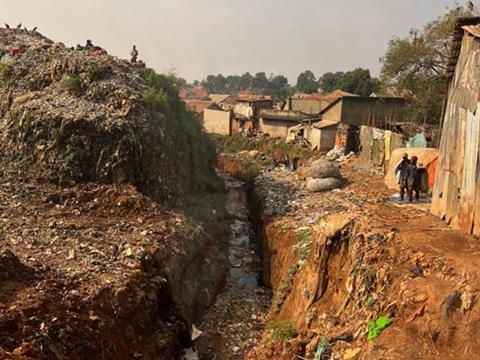
Earlier this month, a massive rubbish dump in the Ugandan capital of Kampala collapsed, killing 26 people. In this article Ceris Turner-Bailes, Chief Executive of WasteAid, tells us about her experience of visiting the dumpsite prior to this tragedy, and the steps that need to be taken to prevent anything like this from happening again.
The tragic deaths of 26 people, including children at the Kiteezi dumpsite in a suburb of Kampala this month brought home the terrible dangers of unmanaged waste.
The accident was caused when a section of the dumpsite collapsed onto houses that were perilously close to the edge of this vast area, killing those trapped underneath – many of whom likely relied on the site to eke out a living waste picking for items to sell.
I visited the Kiteezi dumpsite earlier this year when WasteAid opened its first-ever programme in Uganda. It was a visceral reminder of the scale of the challenge we face and also the risks faced by informal waste workers every day. Poverty forces these people to comb through the mounds of rubbish and make their homes in flimsy structures within touching distance of the mountains of waste.
There are 2,500 tonnes of waste generated daily in Kampala and around 1,500 tonnes of that waste finds its way to the Kiteezi dumpsite. As with many countries where WasteAid works, there is no formal waste management system and large, dangerous dumpsites within sprawling cities are a common sight.
Waste management is underfunded, there are few formal collection systems and scarce government resources mean there is little investment in infrastructure, and critical services such as dumpsite management.
This situation is exacerbated by population growth and significant internal migration into cities across Africa, putting a strain on infrastructure still further and contributing to the growth of the informal sector as population rises outstrip formal employment opportunities.
We’ve found that there is a general lack of expertise and focus on waste management practices at local and national levels, but there is a desire to do more and our approaches and programmes are welcomed and embraced. However, more is needed.
For the most part, it is the private sector and particularly informal waste workers who fill the gap that is left by a lack of waste management services. It is highly likely that those killed and injured in this terrible tragedy were themselves informal waste workers, living close to the dumpsite in makeshift structures that were also the only places to store their collected waste before it was sold on.
Informal waste workers face enormous challenges in their day-to-day lives, yet they fulfil a critical role. They are exposed to numerous health and safety risks while collecting and sorting waste, including exposure to hazardous materials, sharp objects and unsanitary and unsafe conditions.
They often lack access to personal protective equipment and proper training to mitigate these risks and they lack access to social protections. This leaves them vulnerable to health risks, economic insecurity and social exclusion. Informal waste pickers work in precarious conditions and earn low wages, making them economically vulnerable and socially marginalised.
It is with this knowledge that WasteAid implements programmes focused in equal measure on supporting local councils, communities and the informal sector to move the dial on waste management.
In Gambia we are linking experts from within the Chartered Institution of Wastes Management with local authorities in the capital of Banjul to tackle technical waste management problems. Our flagship Wastepreneur programme has just started in Uganda and within this programme we deliver health and safety training alongside business and life skills training and mentoring for those on the first rung of the waste recovery ladder.
Trainees have the opportunity to pitch for small injections of investment that can be life changing for them and their microbusiness. It can support them in moving away from risky and dangerous practices.
It is imperative that there is more focus on and support for waste management systems in Africa and that circular economy approaches are embraced, equally more knowledge transfer and support to policy makers and local authorities can hopefully avoid tragedies such as this one in the future.
If you liked this story, you might also enjoy:
How are the top brands progressing on packaging sustainability?
Sustainable Innovation Report 2024: Current trends and future priorities
Reuse vs. single use – which is better for the environment?
The ultimate guide to global plastic sustainability regulation














No comments yet